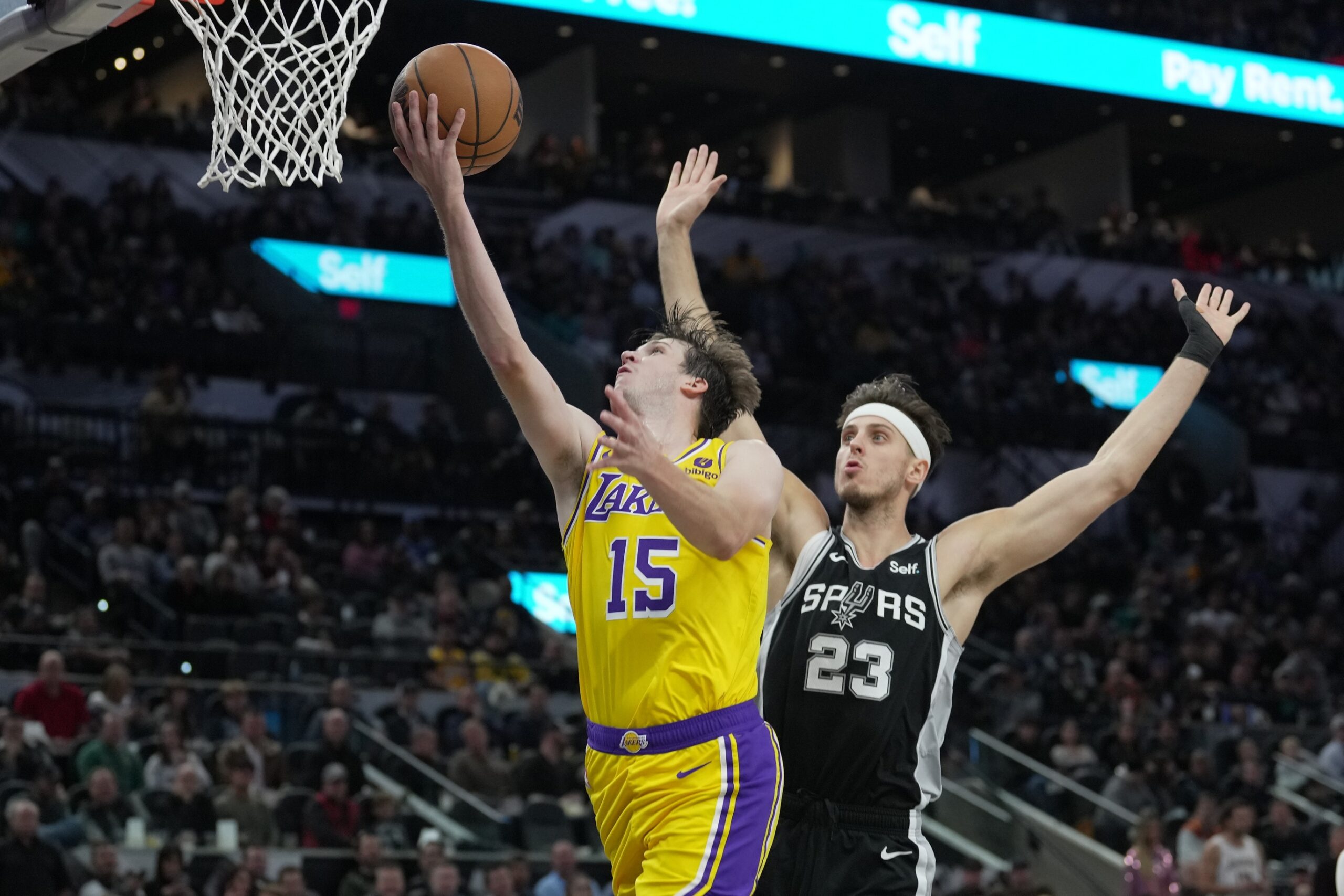The Los Angeles Lakers narrowly avoided losing one of their rising stars, Austin Reaves, during the 2023 offseason due to a rule known as the Arenas provision. This rule is designed to protect teams from losing restricted free agents to competitors with cap space. This could have allowed a team like the San Antonio Spurs to swoop in with a backloaded offer that the Lakers would have struggled to match. Here’s how the Spurs could have used this rule to “steal” Austin Reaves and shake up the Lakers’ future plans.
NBA Business: How the Spurs Almost Stole Austin Reaves from the Lakers
The Arenas provision was created to address a loophole in the NBA’s salary cap system. This loophole allowed teams with cap space to steal away valuable restricted free agents from teams over the salary cap. It was named after Gilbert Arenas. He signed a lucrative deal with the Washington Wizards in 2003 after the Golden State Warriors were unable to match. The rule has played a pivotal role in shaping how teams retain their players. The NBA modified the system in 2005. It prevented teams from losing their restricted free agents to teams with significant cap space. The rule is designed to protect teams with limited financial flexibility while also giving teams with cap room a chance to sign players.
What is the Arenas Rule?
The Arenas rule prevents a team from offering a first-year salary in an offer sheet that exceeds the non-taxpayer mid-level exception (set at $12.8 million for 2024-25) for players with two years of experience. This rule applies to situations where a restricted free agent has only played for two seasons and is eligible for an Early Bird exception. The Lakers could have offered Reaves a contract starting at $12.6 million due to his Early Bird rights. A team with cap space could have taken advantage of the Arenas provision by backloading a contract. This would have significantly increased Reaves’ salary in later years.
How The Spurs Could Have Structured a Deal
A prime example of how the Arenas provision works was seen in 2016. The Brooklyn Nets offered Tyler Johnson a backloaded deal. Johnson’s salary rose from a modest $5.6 million in the first two seasons to $19.2 million in the third and fourth years of his contract. A similar strategy could have been used by the Spurs to potentially “steal” Austin Reaves from the Lakers.
With significant cap space available in 2023, the Spurs could have structured an offer that started with a manageable salary in the first two years but ballooned in the third and fourth. A potential offer for Reaves could have looked like this:
2023-24: $12.4 million (non-tax midlevel)
2024-25: $13.4 million
2025-26: $27.1 million
2026-27: $27.1 million
Total: $80 million
Average: $20 million over four years
This deal would have put the Lakers in a difficult position. They would have had the right to match any offer for Reaves. However, they would not have been allowed to average out the contract like a team with cap space could. Instead, they would have been stuck paying the inflated third and fourth-year salaries under a backloaded contract.
Why the Spurs Were a Threat
The Spurs, with cap space to spare, were in a prime position to make a move for Reaves. With a young roster in need of talent, Reaves could have provided immediate help as a versatile guard. His ability to shoot, create for others, and drive to the basket made him a perfect fit for a rebuilding team looking to grow its core. Moreover, Reaves has shown steady improvement since entering the league. Many around the NBA expected him to take another leap in the 2023-24 season.
The Spurs could have used their cap space not just to add talent but also to hurt a rival like the Lakers, a perennial Western Conference contender. By structuring an offer sheet for Reaves that backloaded his salary, San Antonio could have forced the Lakers to either let him walk or pay a premium for his services in later years. It’s well-known the financial constraints the Lakers face as a team over the salary cap. A deal like this could have made it difficult for them to retain their young star without compromising their financial flexibility. Austin Reaves even admitted to seriously considering joining the Spurs. The lure of playing with Victor Wembanyama was an attractive proposition.
The Lakers’ Fortunate Escape
Fortunately for the Lakers, no team, including the Spurs, made such an offer for Reaves. This allowed the Lakers to re-sign him on a much more manageable four-year, $53.8 million contract. Had a team with cap space structured a backloaded offer sheet for Reaves, the Lakers would have had to make a tough decision: match the offer and risk paying an exorbitant salary in future seasons or let Reaves walk and watch him develop elsewhere.
This scenario showcases how the Arenas provision can level the playing field for small-market teams or those with cap space. It also protects teams over the cap from losing valuable restricted free agents without compensation. The rule also emphasizes the strategic complexities of the NBA’s salary cap system. Teams must carefully navigate their financial constraints while building a competitive roster.
Austin Reaves Chose the Lakers Over the Spurs
The Spurs had the opportunity to make life difficult for the Lakers and potentially steal one of their rising stars in Austin Reaves. By leveraging the Arenas provision, San Antonio could have offered a backloaded deal that would have been hard for the Lakers to match. In the end, no team made such an offer, and the Lakers were able to keep Reaves.






